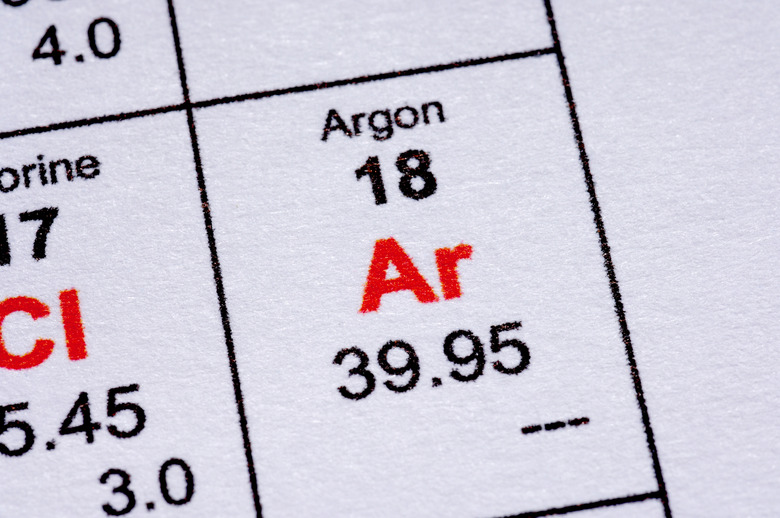What Is The Importance Of Argon?
Whether you know it or not, you're breathing argon right now. But there's no need to be alarmed: This colorless, odorless gas makes up a mere 0.94 percent of the air around you, and it's so nonreactive that it has no effect on living organisms such as humans. This tiny amount of argon is not very important to biology or to Earth's climate, but it's useful to scientists and to modern society.
Production
Production
Argon's chief importance lies in its value to industry. All of the argon people use is obtained from the atmosphere. Before it can be utilized, however, argon must first be isolated. Manufacturers purify argon by first cooling air until it's liquid, then boiling the liquid air and separating it into its components through a process called fractional distillation. This same process produces liquid nitrogen and oxygen, so argon is essentially a byproduct of their manufacture.
Industry
Industry
When metal is welded, it's heated to very high temperatures; if left unprotected, it could react with oxygen in the surrounding air. Shield gases protect the metal during welding to keep it from being oxidized. Argon is highly inert, meaning it doesn't react with other chemicals, so it's an effective shield gas in welding. Its inert nature also makes argon very useful for production of titanium and other reactive materials like silicon, since these tend to oxidize rapidly if not protected from the surrounding air.
Other Uses
Other Uses
Incandescent light bulbs typically contain argon since this inert gas will not react with the filament even at very high temperatures. Some double-paned glass windows employ argon as an insulator between the two panes of glass since it's a very poor conductor of heat. Thanks to its nonreactive properties and its value as an insulator, argon is sometimes also used to inflate dry suits for scuba diving.
Ice Core Data
Ice Core Data
Scientists studying Earth's climate need to reconstruct how the planet's climate has changed over the millennia to get a better sense of future trends. Ice cores are a valuable tool for this kind of research. Scientists drill down into an ice sheet in Antarctica or Greenland, extract a cylindrical sample from the sheet and measure concentrations of nitrogen, argon and other gases trapped in the ice. The ratio of isotopes of argon can help scientists determine average temperature data over a given time period.
References
Cite This Article
MLA
Brennan, John. "What Is The Importance Of Argon?" sciencing.com, https://www.sciencing.com/importance-argon-20907/. 24 April 2017.
APA
Brennan, John. (2017, April 24). What Is The Importance Of Argon?. sciencing.com. Retrieved from https://www.sciencing.com/importance-argon-20907/
Chicago
Brennan, John. What Is The Importance Of Argon? last modified March 24, 2022. https://www.sciencing.com/importance-argon-20907/
